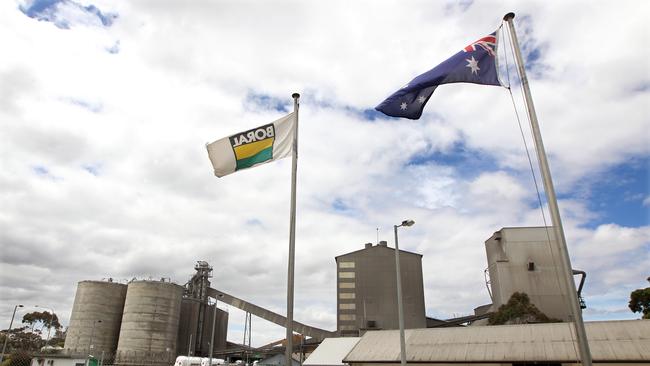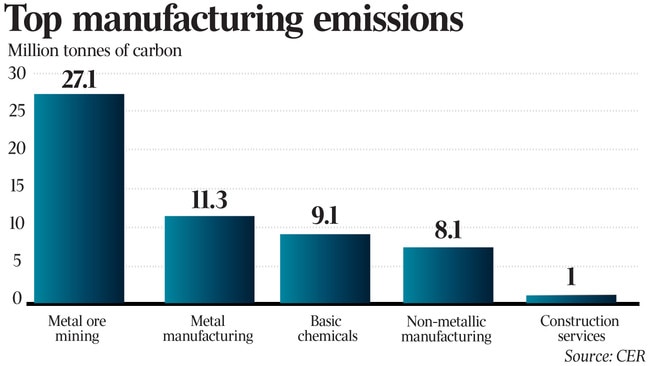Big cement makers and aluminium producers join net zero emissions push in climate pledge
Big cement makers and aluminium producers have joined the rush to set targets for net zero emissions by 2050.

Big Australian greenhouse gas polluters have pledged to hit net zero emissions by 2050, with the nation’s cement and concrete industry and a major aluminium producer taking action to meet green goals ahead of the looming Glasgow climate summit.
Australia’s largest building materials players including Boral, AdBri, Cement Australia and Hanson plan to deliver net zero carbon cement and concrete to Australian society by 2050 while the owner of Victoria’s huge Portland aluminium smelter has also committed to meet the same green goal.
A more ambitious move has also been laid out by billionaire Andrew Forrest’s Fortescue Metals Group which doubled down on its bet it can make hydrogen a key export commodity, staking ambitious plans to decarbonise its iron ore operations on the technology. It wants to cut its Scope 3 emissions – those attributable to customers for its products – to net zero by 2040.
The targets underscore a sweeping move by Australian businesses to curb greenhouse gas emissions with the cement and metals industries both under pressure to lighten their environmental load given they are major carbon emitters.

“The calls for getting to a point of net zero are getting pretty loud and are being communicated across a lot of different fronts and so the industry really thought ‘now’s the time’,” said Ken Slattery, chief executive of Cement, Concrete & Aggregates Australia, which includes Boral and major building materials operators as members.
“Leading up to COP26, now is the time to nail our colours to the mast.”
The looming Glasgow COP26 climate summit has sharpened a focus on both companies and countries’ green commitments with the UN piling pressure on Scott Morrison to exit coal, commit to a net-zero target by 2050 and outline shorter-terms goals to decarbonise the nation’s economy.
Australian corporates are increasingly under pressure on climate change as institutional investors, backed by domestic superannuation funds, use their power to hold companies to account.
Liberal MPs, banks and business leaders are also urging the government to embrace net-zero emissions by 2050 and raise ambitions on 2030 targets, with 70 former diplomats signing an open letter to Mr Morrison and Barnaby Joyce pushing for “urgent action.”
Treasurer Josh Frydenberg has signalled his support for net-zero emissions by 2050, warning businesses, homeowners and borrowers would face higher borrowing costs if the nation was locked out of foreign capital markets over the issue.
While many Australian companies have committed to net zero goals, delivering on that intent remains hugely uncertain.
Just over half of Australia’s 80 top emitting ASX200 companies have now set net zero or carbon neutral goals, but only 16 companies plan to cut operational emissions by switching to clean energy rather than fossil fuels, analysis shows.
Cement is seen as a major contributor to climate change, accounting for around 8 per cent of global CO2 emissions, and is increasingly facing pressure from customers to boost its environmental credentials. Australia’s cement industry has cut its carbon emissions by a quarter since 2000.
“Overcoming the challenges presented by climate change and adaptation are essential to the sustainability of our industry,” Mr Slattery said. “This statement represents a call to action to governments, regulators, procurers, researchers, designers, builders and customers to work with the industry to achieve this important goal.”
Alcoa, a major owner of the Portland smelter in Victoria, also said on Tuesday it aims to be carbon neutral by 2050 while reducing both direct and indirect emissions from its aluminium smelting and alumina refining operations by 30 per cent by 2025 and 50 per cent by 2030 from 2015 baselines.
The US metals giant reached a deal in March that will keep the manufacturing facility running until 2026 with three separate power agreements reached to cover one of the biggest supply contracts in the national electricity market. Currently, more than 30 per cent of the smelter’s consumed electricity is derived from renewable sources, including electricity from a nearby wind farm.
The country’s largest building materials supplier, Boral, announced a month ago it would shift to renewable energy sources and explore carbon capture and storage technologies on its path to slash its carbon emissions this decade and achieve net zero by 2050.
The Sydney company is targeting a 46 per cent cut in scope 1 and 2 emissions by 2030, as well as a 22 per cent decline in scope 3 emissions, but pointed to the need for new and emerging technologies to help get it to its 2050 goal.
The industry has funded an independent assessment of the technology available to decarbonise cement and concrete in construction which will be released in the coming weeks, Mr Slattery said.
“Some of them will need further development, some of them can be implemented now, but they do include things like the development of new cement products, improved efficiency in building design and using cleaner electricity to decarbonise transport. There’s six or seven pathways that will contribute towards the industry being able to get to the net zero position.”




To join the conversation, please log in. Don't have an account? Register
Join the conversation, you are commenting as Logout